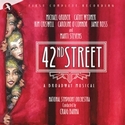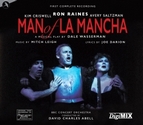|
With dialogue scenes and a bounty of instrumental music from overture to exit music and a bonus track or two, JAY Records is the "score keeper" that keeps on giving more.
 42nd STREET: 42nd STREET:
A BROADWAY MUSICAL
FIRST COMPLETE RECORDING
STUDIO CAST
(2-CD SET)
JAY Records
CD and digital
If you just can't get enough old-school escapist musical comedy jauntiness and joy, JAY Records has an old head-of-the-class classic's big numbers served up, rapturously and repeatedly, with a classy company. Let's park ourselves on 42nd Street for musical immersion. We also get quite a few sections of dialogue for key plot moments, a double-edged sword that cuts a swath of revealed corniness and cliché along with context. But the tone is affectionately embraced rather than overplayed. (A very detailed plot synopsis by Bill Rosenfield is in the booklet that comes with the physical CD.)
Understandably, you might think that this show, so justly celebrated for its dazzling large ensemble tap dancing, in audio-only form will feel lacking. It's a real test, considering JAY's "Complete Recording" gamble to include more dance music than other cast albums of the production. No worries. For a change, close your eyes and open your ears and focus instead on those original super-spiffy Broadway orchestrations of Philip J. Lang used by the National Symphony Orchestra and conductor Craig Barna, as well as the solidness and charm of Harry Warren's old melodies–all intoxicating fun on their own merry merits. But you can still "come and meet those dancing feet," as producer John Yap saw to it to recruit veterans of various productions of the show to record their taps.
It stands to reason that if you love musicals, you're likely to like a musical about the making of a musical. Chronicling the challenges as we go from auditions to rehearsals to opening night, 42nd Street is the iconic example of the genre that lets us see what happens on both sides of the curtain. There is plenty of drama backstage, some back-biting, and then it's back to a splashy song and dance in the show within the show. And here are your recognizable character types: the tough taskmasters, the demanding diva, the hard-working chorus, the wide-eyed newbie thrust into the spotlight to take over for the injured star. The show must go on. You probably know the drill. Adapted from a novel, 42nd Street came to the screen 90 years ago, then took its bows as a Broadway stage incarnation sensation in 1980, running until January 1989, was revived in 2001, and has seen productions around the world.
Prominent in the company assembled for JAY–recorded way back in 1996 but in the vault, vexingly, until now–are a few performers who were engaged (and are engaging) in the same roles they've had on in productions, including two from the 1980s New York reign: Jamie Ross in the key role of the impatient director Julian, suitably stern and singing boldly; and Cathy Wydner ably maneuvering the arc from nervous wannabe to rising-to-the-occasion star replacement Peggy. She also does most of the solo taps (Fun Fact: Karen Ziemba, also a replacement Peggy, did the taps for one number, although that's her only contribution).
Kim Criswell is a bright and appropriately brash presence as Maggie, and Caroline O'Connor is similarly zingy as Annie. The recording's most interesting and nuanced performance comes from the well-cast Marti Stevens as Dorothy, the older star. Her throaty, vibrato-inflected sound and thoughtful phrasing bring dignity to some numbers that could get by on froth and grounding to a role that could be merely unpleasantly unsympathetic. On blithe celebrations like "We're in the Money" the chorus zips along, so darn enthused, infused with that chirpy sound redolent of plucky tunes of the 1920s and '30s. Also assertively perky is "There's a Sunny Side to Every Situation"–the title says it all in this lyric not by Dubin, but from Johnny Mercer.
The reference point for the classification of "Complete Recording" may not be completely clear. It includes full-length treatments of what was chosen as the score's contents for the 1980 mounting; a few other old songs interpolated into later productions and resulting cast recordings would not have been on the table then. Attentive viewers of the original film know that a few of its minor pieces never made it to the stage version. But there's a sunny side to every situation, they say, because the lost items were made up for by adding several same-era numbers also (mostly) by the writing team of Harry Warren and Al Dubin, like their title songs for Dames and Go Into Your Dance to bolster the grand survivors such as "Young and Healthy" and "Shuffle Off to Buffalo." Curiously, lost in the shuffle, as far as 42nd Street stage cast recordings go, had been "I Know Now," something introspective, introduced in The Singing Marine by Dick Powell. It is rescued here. It is an outlier among the other more caffeinated concoctions, presented as a lamenting realization about a romance. Marti Stevens soberly does it justice, then it's seemingly hijacked by a raucous chorus, giving way to Michael Gruber for a rewardingly robust finish.
With reprises, overture, entr'acte, dance music, bow music, exit music, and dialogue underscoring, you'll have numerous chances to hum and hold onto the memorable melodies you may have long ago memorized: "Lullaby of Broadway," "You're Getting to Be a Habit with Me," and "42nd Street." But they wear well when handled so well. And don't be surprised if you find yourself in an easy chair, easily smiling and tapping your feet–or even jumping up and tap-dancing. And as long as you're on your feet, why not give a standing ovation to JAY Records and this cast for this long-withheld, worth-holding-onto recording.
 MAN OF LA MANCHA MAN OF LA MANCHA
2000 CONCERT CAST
(2-CD SET)
(RE-MIXED)
JAY Records
CD and digital
Revisiting the musical Man of La Mancha, especially with all its dialogue on a recording, highlights its themes of idealism and virtue, is a stirring experience. And it stirs up emotions. As its odd, odds-defying hero steadfastly imagines a world beyond its ugly realities, we get caught up in the tale being spun, the denial, and the trial. There have been numerous recordings of this score over the years (including those in languages other than English) since the first cast album back in 1965. JAY Records took the splendid participants of a one-night concert performance in England in 2000 into a studio to preserve their performances of the songs as well as the script. It was released the next year as a 2-CD set, and then reissued last year after a retooling with JAY's own DigiMAX process. (Yes, the sound is terrific and dynamic, the BBC Orchestra conducted by David Charles Abell in excellent balance, bringing out the needed colors and characterizations without overpowering or overselling anything.) Along with the label's long-withheld/ recently emerging 42nd Street and Anyone Can Whistle, it's part of their mission to luxuriously examine and celebrate memorable scores.
With a large cast, orchestra, and chorus (the Maida Vale Singers), in very good hands are the music of Mitch Leigh, the lyrics of Joe Darion, and the book scenes by Dale Wasserman, all of whom have passed away in the years since this recording was done. Mr. Wasserman's plot synopsis and his reflections on the musical and its history fill the booklet that comes with the physical double-CD package, which also has several black-and-white photos of the cast. While some listeners won't want to hear the longer dialogue sections over and over, some are more compelling than others–especially those in Act 2–and, as they're tracked separately, it's easy enough to do either a long listen or a song listen.
Acting and singing with conviction and eliciting sympathy and admiration, Ron Raines was a felicitous casting choice to be the leading Man, already having a head-start with the role. He'd donned the knightly armor in 1994 for Portland Opera and had released in 1998 (on the TER label) two of the score's key songs for his JAY Records solo CD, Broadway Passion. His Don Quixote is not as fragile or baffled as some have played him, but his noble attitude and fortitude don't demolish the sense of vulnerability and allegiance to his character's (mis)perceptions. He finds shadings and calibration in his delivery of that most heroic anthem "The Impossible Dream," providing power and pathos. As his loyal BFF sidekick Sancho, Avery Saltzman delivers the welcome comic relief without cascading into jarring goofball territory. (I would not have minded a bit more glee, but I do really like him doing "I Really Like Him" in his cheery manner.)
Kim Criswell, who has notably shown her versatility in many JAY recordings (other studio casts and solo outings), is a vibrant Aldonza. While quite a few of her line readings have the same level of brusque impatience and sneer, her singing has a more successful range of moods and depth, not depending on the same old/same old rage for "It's All the Same" and is convincing in her gradual dropping of defenses as the play goes on. George Dvorsky (yet another JAY regular) is a welcome addition as a muleteer, with the pot sweetened by giving him a bonus track to lead a reprise of "Little Bird, Little Bird" which is allowed to be far more gentle than the show's in-character taunting attitude. Another impactful vocal moment arrives with Hilton Marlton's sage observance, "To Each His Dulcinea."
A few quibbles: I think the four performers tasked with singing the untruthful claim "I'm Only Thinking of Him" would be more effective if the self-concern could be more transparent. I've always liked the jaunty little "Barber Song" and I wish dialogue didn't obscure the first few lines. Lastly, the music that accompanies the battle near the end irritates me with its harshness and relentless repetition (yes, I know it's a battle and can't be lovely, but ...). Well, these are small, non-deal-breaker grounds for grousing. Three cheers for JAY Records for staying "true to this glorious quest" for long-length, loving looks back at magnificent musicals with quality casts.
|
|